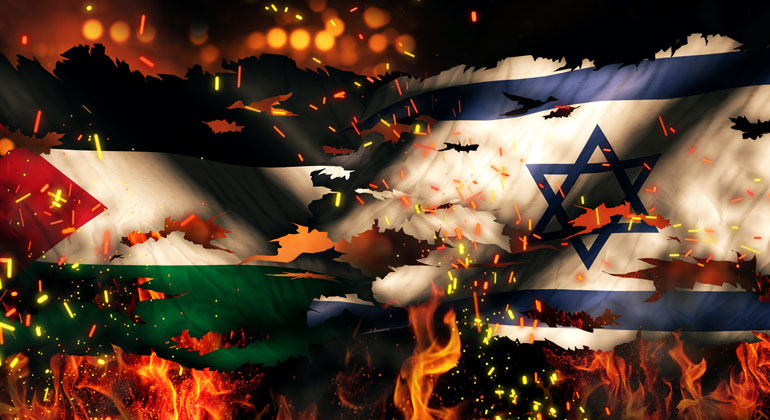Is peace between Israel and Palestine possible?
The relief and development organization Oxfam fears that a full Israeli blockade of Gaza will lead to a humanitarian catastrophe.
Mustafa Tamaizeh, Oxfam’s Acting Country Director in the Occupied Palestinian Territories and Israel, comments on the current conflict: “Oxfam is appalled by the attacks on Israel and also extremely concerned about the many civilian casualties in Gaza. Violence never paves the way to peace. The international community must use all diplomatic means at its disposal to achieve an immediate ceasefire.”
“The Israeli government’s decision to impose a ‘total siege’ on Gaza, in addition to the extensive closure already in place, will deprive civilians in Gaza of essentials such as food, water and electricity. This is collective punishment of the civilian population and violates international humanitarian law. This decision will not contribute to peace and security, but will further fuel the crisis.”
According to UN figures, more than 180,000 people are currently displaced in Gaza; 135,000 of them are sheltering in already overcrowded UN aid schools. Families lack food, water and sanitation, and many are trapped in their homes with nowhere to flee, according to the latest Oxfam report.
In this situation, former Israeli intelligence chief Yamos Adlin threatens on Israeli television, “We will flatten everything (in Gaza).”
With this kind of thinking and acting on both sides, of course, peace will never be possible.
But there are always alternatives. The three monotheistic religions of the Middle East could play a central role in this.
But for the past 100 years, religions in the Middle East – as elsewhere – have been contributing to war rather than peace. Each is afraid of the superiority of the others. But history teaches that fear and mistrust cannot be overcome by war and violence. “Ethics is more important than religion,” says the Dalai Lama. The central virtue of the three Abrahamic religions is, in the same way, mercy. There is a huge untapped potential for peace here. The common basis of Judaism, Christianity and Islam is: understanding instead of condemning, reconciling instead of destroying, loving instead of hating. Empathy is the path to peace.
Gottfried Hutter, psychotherapist, theologian, Middle East expert with decades of contacts to important personalities from politics and all three religions in the Middle East, makes in his book “Honorable Peace: 100 Years of Middle East Conflict”, a surprising, at first seemingly utopian, but still feasible peace proposal: The controversial Israeli settlements in the West Bank as a chance for peace!
Utopian, unrealistic, crazy? Certainly still a vision. But already often the visions of today were the realities of tomorrow.
So why shouldn’t two states coexist peacefully? Israel with a Palestinian minority next to Palestine with a Jewish minority of today’s settlers?
It is precisely the Jewish minority of settlers in the West Bank, which is so controversial, that now offers a realistic opportunity to transform the entire West Bank, including the Jewish settlements and Gaza, into a new Palestinian state. This would finally be a political balance between Israel and Palestine with the chance of prosperity for all. The two-state solution long favored by many, including Germany.
How did things go in Europe after 1945?
Economic cooperation was the basis for prosperity and political cooperation. That was the incentive. So Palestine and Israel and their respective minorities could also cooperate economically and invite other Arab countries to form a Middle East community, a Middle East Union – with the aim of creating peace and prosperity. In doing so, a new economic miracle could emerge, following the EU’s example and in cooperation with the EU.
At the beginning, of course, there would have to be confidence-building steps similar to those taken to overcome the Cold War a few decades ago in Europe. The goal must be reconciliation and peace, monitored for a time by UN blue helmets. The three Abrahamic religions could play a central role in this. After all, all three religions are based on the values of love, peace and mercy. A strong political and spiritual personality would have to represent this vision, for which millions of people of all religions throughout the Middle East yearn, in a sustainable, credible and publicly effective way. Perhaps a woman like Angela Merkel, who thinks from peace and not from war. Or a man like Mikhail Gorbachev, who had the courage to take the first disarmament step more than 30 years ago.
Clever politicians and religious leaders in Saudi Arabia and Iran also hope for this vision – as Gottfried Hutter points out. Thus, a growing Middle East peace could become the key to world peace. The Middle East policy so far has been and still is too visionless. Above all, the importance of religions for peace in this region has been overlooked by the USA and the EU in all negotiations. However, history after 1945 teaches that even the point of deepest conflict can be the beginning of reconciliation in a new era. Peace is always and fundamentally possible. To claim otherwise is ideology and misanthropic.
This is an invaluable book full of stimulating new ideas, which Gottfried Hutter presented six years ago. Finally a book that thinks not from war but from peace and therefore shows that peace is also possible between Israel and Palestine.
“Our land is big enough for both”
The Old Testament story of the reconciliation between the two hostile brothers Jacob and Esau could serve as a model: Four thousand years ago, these two “arch-enemies” met after decades of quarreling. Jacob had betrayed Esau and Esau wanted to kill him. But when Jacob, after a night dream, asks Esau’s forgiveness in a gesture of humility, Esau is deeply touched and says, “Welcome, my brother. Our land is big enough for both of us.”
Peace always begins with a dream of peace
Israelis and Palestinians can also recognize today that their “land is big enough for both of us.” Both should confess this before the United Nations and ask each other for forgiveness. The decisive factor will be whether one has the courage to take the first step. This first step in a new direction is fundamental.
Since 2006, there have been three wars between Israel and the Palestinians. The permanent occupation in the West Bank is not a solution. Why and for what a fourth and fifth war?

There are always alternatives
It is precisely the militarily stronger that can take the first step. Peace is also possible between Israel and Palestine. Prime Minister Netanyahu could take this first step and declare before the UN: “We did wrong to the Palestinians in 1948. For that we ask forgiveness. But please understand that Jews also want a homeland again after 2,000 years of persecution. We forgive and we ask forgiveness. The land is enough for both of us.”
Without a dream of peace, there is none.
- Gottfried Hutter “100 Years of Middle East Conflict – Honorable Peace: How Can Lasting Peace Be Secured Between the Muslim World and Israel” | Archway Publishing 2019
Source
Franz Alt 2023 | Translated with www.DeepL.com/Translator (free version)








